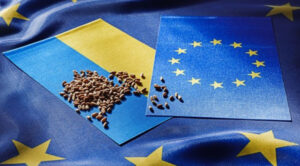
The European Union has decided to reinstate quotas on agricultural imports from Ukraine, which were suspended at the start of the full-scale invasion in 2022 to support Ukrainian farmers. The updated restrictions will come into force on June 6, Bloomberg reported, citing the European Commission.
According to a European Commission representative, the quotas will be a temporary measure. The EU is currently working on revising the deep and comprehensive trade area between the EU and Ukraine. The quotas, available until the end of 2025, will amount to 7/12 of the usual annual volumes.
No member state opposed the decision. Sweden, the Czech Republic, Denmark, Estonia, Finland, Germany, Ireland, and Lithuania abstained.
Bloomberg recalled that agricultural exports are crucial to Ukraine’s economy, and easy trade with the EU has helped Ukrainian farmers overcome major difficulties, including the temporary loss of their main export route through the Black Sea and production problems caused by landmines and military conscription.
However, the sharp increase in exports of relatively cheap Ukrainian goods to the EU market has sparked resistance from local farmers in countries such as Poland, Hungary, and Slovakia. This has provoked a political standoff over protectionist measures between neighboring countries, some of which, such as Poland, were previously strong allies of Ukraine.
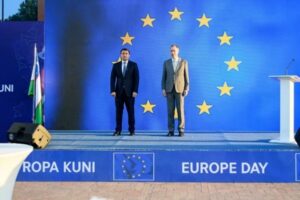
The Central Asia-European Union Economic Forum and Investor Forum will be held in Uzbekistan in November. This was announced by the European Union Ambassador to Tashkent, Toivo Klaar, during the celebration of Europe Day on May 12.
“These forums will open up new business opportunities,” said the head of the diplomatic mission.
As a reminder, during the first Central Asia-European Union summit, which took place in April, the EU announced an investment package for Central Asia worth €12 billion for the development of four areas: transport corridors, critical raw materials, green energy, and satellite internet.
Toivo Klaar also noted that the EU is looking forward to the next Human Rights Dialogue.
In addition, the European Union is expecting a visit by Uzbekistan’s President Shavkat Mirziyoyev to Brussels this year to sign an Agreement on Enhanced Partnership and Cooperation.
“This historic visit will open a new chapter in relations between the EU and Uzbekistan, which will be deepened, diversified, and modernized in many areas,” the EU ambassador said in his speech.
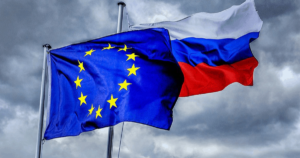
The European Union has approved a 17th package of sanctions against Russia, aimed at increasing pressure on the Russian economy and limiting opportunities to circumvent previously imposed restrictions. A key element of the new package is the introduction of sanctions against Russia’s so-called “shadow fleet” — a network of ships used to circumvent sanctions and export oil.
Sanctions against the “shadow fleet”
As part of the new sanctions package, the EU has imposed restrictions on around 200 vessels linked to Russia’s “shadow fleet.” These vessels, often old and poorly insured, are used to transport Russian oil in circumvention of the restrictions in place, including a price cap of $60 per barrel.
Sanctions against companies and individuals
The new sanctions package also includes:
31 companies involved in arms supplies and sanctions evasion.
75 individuals linked to the Russian military-industrial complex, including judges involved in cases against opposition figures.
Financial institutions supporting Russia’s military actions.
Protection of critical infrastructure
The EU has also imposed sanctions on organizations and individuals involved in cyberattacks, human rights violations, and sabotage of critical infrastructure, including submarine cables and energy facilities.
Outlook
Despite the introduction of the 17th package of sanctions, additional measures are being discussed, including the possible introduction of 500% tariffs on Russian oil imports to countries that continue to purchase it. Restrictions on imports of liquefied natural gas (LNG) from Russia are also being considered.
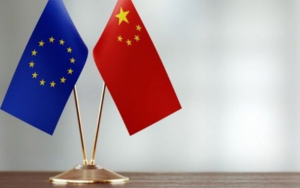
Chinese and EU authorities have agreed to resume talks on duties on electric cars, the Chinese Ministry of Commerce said at a press conference. The talks will resume as soon as possible to create favorable conditions for investment and cooperation between Chinese and European companies, the ministry said.
US President Donald Trump announced the day before that he would impose additional 34 percent duties on goods from China and 20 percent duties on EU shipments. Earlier, he also imposed 25% duties on all car imports. In turn, the EU imposed higher duties on Chinese electric cars last year, including 17 percent for BYD, 18.8 percent for Geely and 35.3 percent for SAIC.
In January, the three companies went to the Court of Justice of the European Union to appeal the new duties. Last November, Beijing and Brussels discussed the possibility of replacing duties for China with an obligation to sell electric cars at a minimum price.
Chinese authorities, duties on electric cars, EUROPEAN UNION
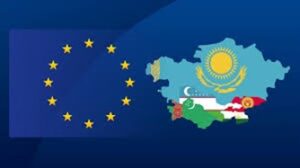
On April 3-4, the first-ever summit meeting between the EU and Central Asian countries will take place in Samarkand. This landmark event will open a new page in relations between the regions, marking a transition to a qualitatively new level of multilateral cooperation.
Since the emergence of newly independent states in Central Asia, the EU has been working to establish bilateral partnerships with them. Since 1991, the development of the EU’s strategy in Central Asia has gone through several important stages, which were driven by changes in the system of international relations, the dynamics of European integration, and the role of Central Asia in global politics.
The first large-scale program of cooperation was the Technical Assistance to the Commonwealth of Independent States (TACIS, 1991-2006), which supported the countries of the region in political and economic reforms, transition to a market economy and strengthening the rule of law. More than 3,000 projects were implemented under this initiative, totaling more than €7 billion. The key achievement of TACIS was the conclusion of Partnership and Cooperation Agreements with the countries of Central Asia.
Another important milestone was the adoption of the first EU Strategy for Central Asia in 2007. This period was marked by the beginning of the perception of Central Asia as a single region. A mechanism of annual meetings at the level of foreign ministers was created.
The policy of neighborhood and regional partnership implemented by the Republic of Uzbekistan under the leadership of President Mirziyoyev made a significant contribution to the rethinking of the strategy. As a result of joint efforts, a completely new political atmosphere has emerged in Central Asia. In a few years, many problems that had been accumulating for decades were resolved. As a result, the region is becoming a space for mutually beneficial cooperation and sustainable development.
In other words, Central Asia is no longer just a bridge between the East and the West, as it was traditionally perceived, but an independent actor in international relations.
Central Asian states are interested in attracting European investments, technologies and innovations for sustainable development. The EU is actively cooperating with the regions in politics, security, trade, investment, and cultural and humanitarian relations, strengthening the legal framework for cooperation. Kazakhstan and Kyrgyzstan have already signed partnership agreements with the EU, and Turkmenistan, Tajikistan, and Uzbekistan are preparing to sign theirs. In October 2023, a Joint Roadmap was adopted to deepen ties between the EU and Central Asia.
In recent years, Brussels has been building relations with five Central Asian states under Comprehensive Partnership and Cooperation Agreements. To date, Kazakhstan and Kyrgyzstan have already signed such agreements with the EU. In March 2024, Turkmenistan signed a protocol to the Agreement, and Tajikistan and Uzbekistan are finalizing preparations for signing the document.
An additional impetus to the development of cooperation was given by the adoption in October 2023 of the Joint Roadmap for Deepening Ties between the EU and Central Asia.
The European Union remains the largest investor in Central Asia, accounting for more than 40% of foreign direct investment over the past ten years (over €100 billion).
One of the areas of strategic partnership is the development and processing of mineral resources. In the context of diversification of supplies of critical materials, Central Asian countries are playing an increasingly important role in the global market. The signed Memoranda of Understanding with Kazakhstan (2022) and Uzbekistan (2024) allow European companies to intensify cooperation with the region’s countries in high-tech areas.
Among the infrastructure projects aimed at developing the region’s logistics potential, the China-Kyrgyzstan-Uzbekistan railway project plays a special role.
A new impetus to the development of cooperation was given by the results of the first investment and transport forum of Central Asia and the EU, held in January 2024 in Brussels. During the event, it was announced that 10 billion euros would be allocated to modernize the Trans-Caspian International Transport Route connecting Asia and Europe.
Another important area of partnership with the EU is the digital integration of Central Asia into the global economy. In March of this year, during the regional visit of EU Commissioner J. Sikela, the TEI Digital Connectivity project was launched to develop satellite communications, expand broadband Internet access, support digital innovation, and improve cybersecurity.
The fight against climate change and the transition to sustainable development remain a key aspect of cooperation, with the main initiatives being the SECCA project under the Team Europe strategy, the CAWEP Water and Energy Program, and Green Central Asia.
The EU remains not only an important trade, economic, and investment partner for the region, but also a key benchmark in the field of sustainable development, digital transformation, and environmental programs.